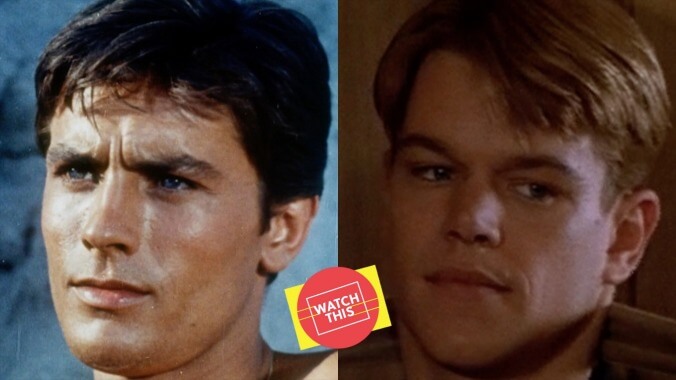Tom Ripley is a chameleon. Over the course of five tense page-turners by the American novelist Patricia Highsmith, the famous con artist assumes stolen identities, falsifies documents, and murderously ties up loose ends—all to forge, in multiple senses of the word, the life that he wants. For an actor, the challenge and perhaps also the allure of Ripley as a character lies in finding the man beneath the machinations, if there’s really one to find. Multiple stars have secured the role over the years—Andrew Scott, TV’s Moriarity-turned-hot-priest, will tackle it next, in a serialized Showtime adaptation. But conventional wisdom as to what qualifies as the quintessential portrayal has coalesced around two depictions, radically different in characterization despite being based on the same source material, the first of the Ripley novels.
Le samouraï himself, Alain Delon, was still on the cusp of stardom when he lent his chiseled good looks and slightly aloof sex appeal to the role. He plays Ripley much as Highsmith wrote him: craven and amoral, a coolly blank cipher realizing his class aspirations through homicidal scheming. Purple Noon picks up a few chapters into The Talented Mr. Ripley, with Tom having already insinuated himself into the life of Philippe Greenleaf (Maurice Ronet), the wealthy playboy whose father has hired Ripley to travel to Italy and bring him back to San Francisco. Delon, twisting his matinee-idol charisma into an icy imitation of carefree bachelorhood, betrays few hints of sexual desire in the character’s obsession. It’s Philippe’s charmed life he covets—and so there’s little emotion to the film’s turning point, which plays out as a seemingly jokey conversation about murder that takes an abrupt, chilling turn out of the hypothetical.
Director René Clément bathes the action in sunlight and pastels, giving everything a bright travelogue luster—the daydream of Mediterranean luxury Ripley is after. He also matches the character’s detached calculation through rather matter-of-fact violence, affording no more emphasis to the murders (or their arduous cleanup) than he does to Ripley meticulously reproducing his victim’s handwriting. It’s all just steps on Tom’s journey of upward mobility, his plan to self-actualize into a man of luxury and means. The film’s an icy procedural wrapped in a character study of a human black hole.
The fashionable opinion is that Purple Noon is not just the first but also the best of the Ripley adaptations. But Anthony Minghella arguably wrings richer drama from Highsmith’s 1955 bestseller. Though it fruitfully restores the opening act, the ’99 Talented Mr. Ripley also deviates, in some bold and productive ways, from the novel—for example, by making explicit the homoerotic subtext Purple Noon almost entirely excised. That choice informs Ripley’s first crime, which here isn’t premeditated but instead an impulsive response to rejection—our anti-hero lashing out at Dickey Greenleaf (a never-better Jude Law), the rich-kid scion who’s grown weary of his company, as though he were changing his mind about a puppy he’s adopted. When Tom takes over Dickey’s life, it’s out of some combination of class envy, desperation, and misdirected grief.
Blessed with a powerhouse cast (including Gwyneth Paltrow, Cate Blanchett, and an exquisitely catty Philip Seymour Hoffman), Minghella’s Ripley is one of the great prestige productions of the Miramax era—an ingenious suspense contraption with the sting of tragedy. What the writer-director locates in Highsmith’s novel is the agony of a double life: Unlike Delon’s dispassionate psychopath, this Ripley suffers a psychological toll from maintaining his masquerade, from constantly passing as both wealthy and straight. Ultimately, that aspect, fairly fresh to the character, comes across because of Matt Damon’s magnificent performance in the title role; without diminishing Ripley’s cunning, he makes him a lonely, sympathetic figure—dangerous because he has feelings, not because he doesn’t. Just about every Ripley story plays with the audience’s identification, seducing us into rooting, on some level, for this scheming monster to get away with it all. But only Damon’s Ripley breaks our heart, even as his actions chill us straight to the marrow.
Availability: Purple Noon is currently streaming on The Criterion Channel, and can also be rented or purchased from Amazon or iTunes. The Talented Mr. Ripley is currently streaming on HBO Max, and can also be rented or purchased from Amazon, Google Play, iTunes, YouTube, Microsoft, Fandango, Redbox, AMC, DirectTV, or VUDU.

 Keep scrolling for more great stories.
Keep scrolling for more great stories.
